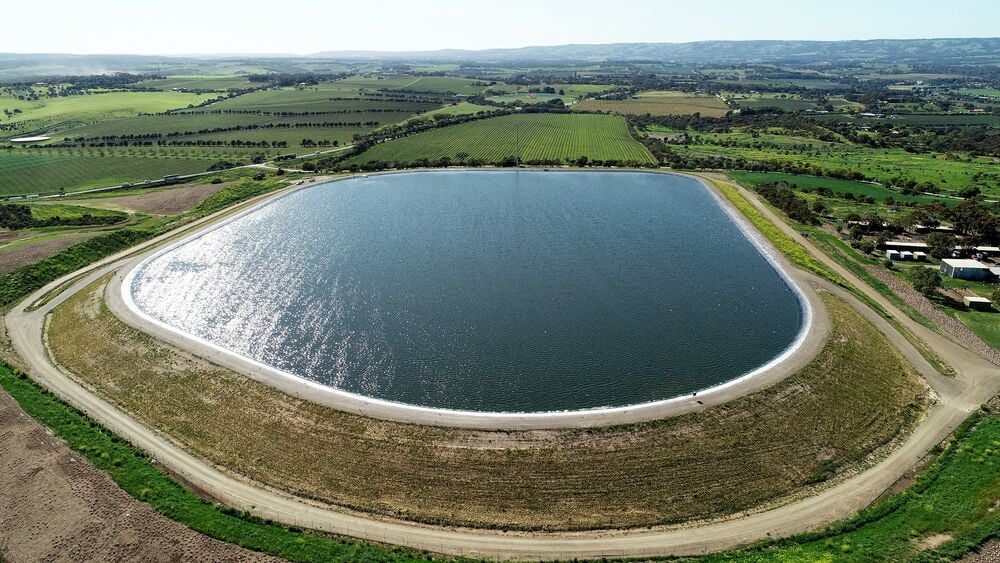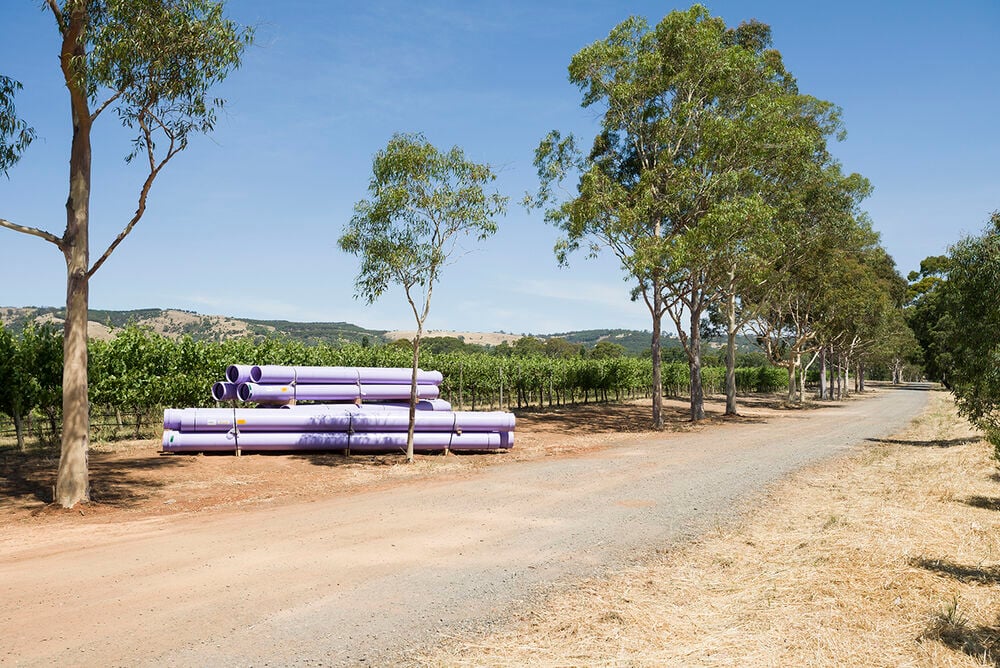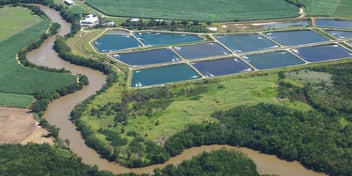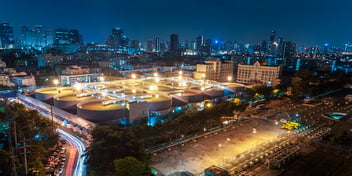From Water to Wine
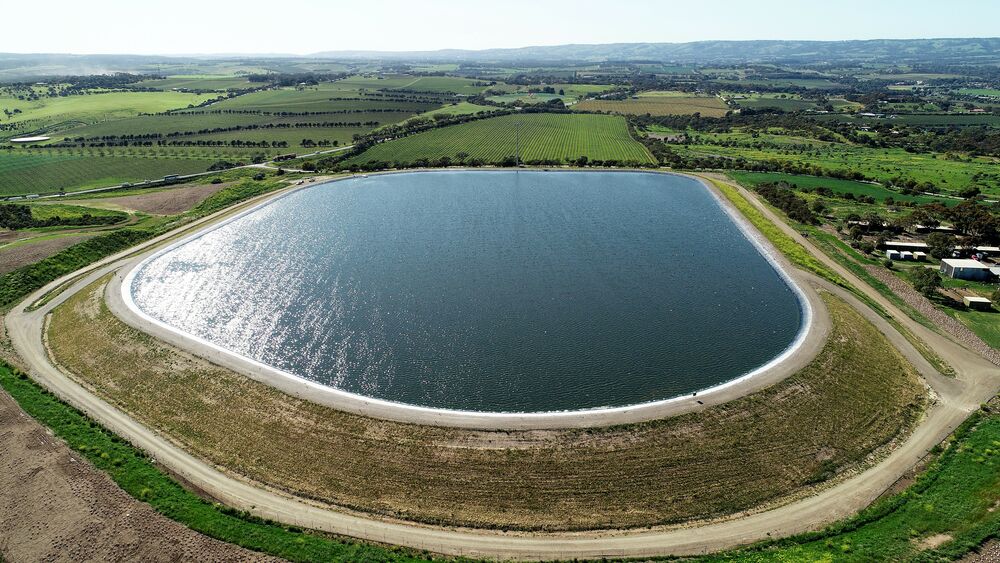
Water, wine, and sustainability are three things South Australians love! You may recall in the last edition of Source SA we reported on the Renmark Irrigation Trust that uses water sourced from the River Murray to supply a range of crops including grape vines for wine production. In this edition, we look at recycled water in wine production and investigate the onsite wastewater treatment at wineries as well as the benefits derived from recycled water sourced from metropolitan wastewater treatment plants used for irrigating vineyards.
Winery Wastewater Treatment
Water is critical in the production of wine, from irrigation of grape vines, through to wash water in the wine production process. One of the biggest challenges for wineries is the sustainable management of water which can impact on the viability of a winery.
We spoke to Mitch Laginestra from GHD, an experienced process engineer who has a passion for sustainable wastewater treatment practices at wineries, to get an understanding of sustainable practices at wineries.
‘Water cycle management at wineries should be close to the heart of all good vignerons, although many wineries struggle with managing water usage and dealing with wastewater that can be quite difficult to treat.’
A significant issue for wastewater treatment at wineries, is that most of the wastewater generated occurs during the 'vintage' period, when grapes are being crushed and pressed and water is needed for a range of washing and rinsing purposes. The design of the treatment system needs to be designed for this peak.
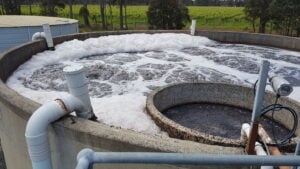
Due to the high organic load of winery wastewater, treatment options are generally biological in nature, but depend on a range of factors such as the size of the winery, availability of land and reuse opportunities for the wastewater.
Having a robust and well managed wastewater treatment process allows for sustainable outcomes in wineries. Recycled winery wastewater is typically used for irrigation of vines, however this needs to be managed carefully to ensure sustainable soil and vine health. There are also opportunities to reuse water for other purposes at wineries, such as washdown of hard surfaces, cooling and landscape irrigation too if appropriate treatment objectives can be achieved.
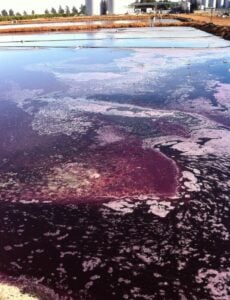 For larger wineries, treatment using anaerobic biological processes also offers opportunities to capture biogas that can be used to generate energy for onsite use in wine production and resultant solids residuals can also be composted and used as a soil ameliorant at the winery.
For larger wineries, treatment using anaerobic biological processes also offers opportunities to capture biogas that can be used to generate energy for onsite use in wine production and resultant solids residuals can also be composted and used as a soil ameliorant at the winery.
Laginestra said “As wastewater treatment involves a cost few wineries realise full reuse potential, however, there is a satisfaction from treating the effluent to a standard that allows a range of reuse applications.” Spoken like a true process engineer.
The generation and use of recycled water at a winery is a key pillar to sustainable operations. By adopting a recycle mindset, wineries can make the most of this precious resource, in production of a most precious product!
Centralised Recycled Water Supply
The McLaren Vale wine region is a key agricultural region for South Australia and Australia, producing around 35,000 tonnes of grapes per annum that represents around 6% of national grape production. It also represents 20% of premium grape national production.
Annually, the region relies on 10,000ML of water for irrigation. With deteriorating groundwater quality, the water security of the region is increasingly under threat as the impacts of climate change take effect and ground water becomes less available and reliable for irrigation at wineries.
Willunga Basin Water, a subsidiary of Water Utilities Australia, now supplies approximately 6000ML/annum of recycled water to around 230 irrigation customers across the McLaren Vale wine region. Willunga Basin Water is now critical to meeting the regions water security needs.
The recycled water supplied to Willunga Basin Water customers is largely sourced from the Christies Beach Wastewater Treatment Plant owned by SA Water.
We spoke to Craig Heidenreich, General Manager at Water Utilities Australia about Willunga Basin Water's recycled water supply scheme at McLaren Vale.
“The supply of recycled water to our customers is a sustainable alternative to groundwater as it is climate independent and of a quality that is suitable for sustaining premium wine production from the region.”
The McLaren Vale Wine Region is a significant economic sector for South Australia generating more than $300M in wine sales revenue and a further $160M in tourism revenue. The region employs about 2,500 people in grape growing and wine making businesses, not including the jobs arising from the associated tourism sector.
"The supply of recycled water is critical to the long-term viability of the region and sustainability of the income and jobs associated with the regions wine and tourism sectors.” Heidenreich said.
In March 2020 Willunga Basin Water completed the construction of a 600ML recycled water storage dam which enables them to increase the supply of recycled water to the region. Further expansion is also being planned to meet the on-going demand.
In addition to the economic opportunities that arise from growth of the McLaren Vale wine industry, large scale use of recycled water has directly benefited the local groundwater resource and also has had a positive impact on the marine environment through diverting treated wastewater from Christies Beach WWTP that would have otherwise been discharged to the Adelaide Coastal Waters.
Like all agricultural industries, wine production is inextricably linked to water, and what better way to produce wine, than to use recycled water wherever possible. While sometimes this comes at a financial cost in the short term, a longer-term view is necessary to ensure the future viability of the industry and to meet the demands and expectations of wine lovers around the world.

